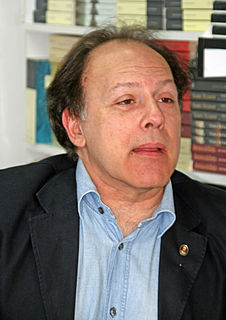A Quote by Marcus Tullius Cicero
Nothing stands out so conspicuously, or remains so firmly fixed in the memory, as something which you have blundered.
Related Quotes
I do know that some people believe that I see gender as a "choice" rather than as an essential and firmly fixed sense of self. My view is actually not that. No matter whether one feels one's gendered and sexed reality to be firmly fixed or less so, every person should have the right to determine the legal and linguistic terms of their embodied lives.
Surely the memory of an event cannot pass for the event itself. Nor can the anticipation. There is something exceptional, unique, about the present event, which the previous, or the coming do not have. There is livingness about it, an actuality; it stands out as if illumined. There is the "stamp of reality" on the actual, which the past and future do not have.
He misses the feeling of creating something out of something. That’s right — something out of something. Because something out of nothing is when you make something up out of thin air, in which case it has no value. Anybody can do that. But something out of something means it was really there the whole time, inside you, and you discover it as part of something new, that’s never happened before.
A sign, or representamen, is something which stands to somebody for something in some respect or capacity. It addresses somebody,that is, creates in the mind of that person an equivalent sign, or perhaps a more developed sign. That sign which it creates I call the interpretant of the first sign. The sign stands for something, its object. It stands for that object, not in all respects, but in reference to a sort of idea, which I have sometimes called the ground of the representamen.
Americans' distrust of the conspicuously intellectual - a habit we learned, I suppose, on the frontier, but which remains a feature of the national character - has the virtue of puncturing the pretentious and exposing the fake, but it may also have impaired American listeners' patience for music that is especially complex or austere.
In the world it is called Tolerance, but in hell it is called Despair...the sin that believes in nothing, cares for nothing, seeks to know nothing, interferes with nothing, enjoys nothing, hates nothing, finds purpose in nothing, lives for nothing, and remains alive because there is nothing for which it will die.
The truth never shines forth, as the saying goes, because the only truth is that which is known to no one and which remains untransmitted, that which is not translated into words or images, that which remains concealed and unverified, which is perhaps why we do recount so much or even everything, to make sure that nothing has ever really happened, not once it's been told.
Among the basic freedoms to which men aspire that their lives might be full and uncramped, freedom from fear stands out as both a means and an end. A people who would build a nation in which strong, democratic institutions are firmly established as a guarantee against state-induced power must first learn to liberate their own minds from apathy and fear.
sometimes a man stands up during supper and walks outdoors, and keeps on walking, because of a church that stands somewhere in the East. And his children say blessings on him as if he were dead. And another man, who remains inside his own house, stays there, inside the dishes and in the glasses, so that his children have to go far out into the world toward that same church, which he forgot.
One often feels as though something had happened before, I remember. It comes quite close to you and stands there and you know it was just this way once before, exactly so; for an instant you almost know how it must go on, but then it disappears as you try to lay hold of it like smoke or a dead memory. "We could never remember, Isabelle," I say. "It's like the rain. That has also become one, out of two gasses, oxygen and hydrogen, which no longer remember they were once gasses. Now they are only rain and have no memory of an earlier time.
Another strange notion pervading whole peoples is that the State has money of its own; and nowhere is this absurdity more firmly fixed than in America. The State has no money. It produces nothing. It existence is purely parasitic, maintained by taxation; that is to say, by forced levies on the production of others. 'Government money,' of which one hears so much nowadays, does not exist; there is no such thing.












































